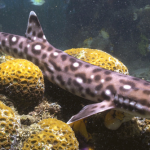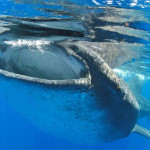This article is reposted from my old blog Deep Type Flow and was originally published 7/12/2010
To a recent roundup of whale shark news, I appended a sort of human interest one-liner about how “shark” is the only word in the English language that derives from a Yucatec (Mayan) Indian word – “Xoc” (pronounced like “shock”). It was just one of those factoid tidbits picked up somewhere along the line of life, maybe while working in Mexico, I don’t remember. It tickled some interest from blogger @hectocotyli on Twitter, who posted a follow-up tweet questioning whether this was actually true, and citing a paper by Tom Jones, from the 5th Palenque Roundtable in 1983. That paper is entirely devoted to the question of the origins of the word shark. I read it and was transported, what a great story! So here it is then, a deeper look at the origins of this word “shark”, with thanks to @hectocotlyi for having an inquiring mind and for finding the paper.
According to Jones, the very first mention of the word shark in association with the animal for which we use the name today was in a 1668 work by John Wilkes. One of the first mentions of the word in a dictionary, however, is in an anonymous work from 1689, which defines a shark as a “shifting knave”. In other words, a crook, dodgy sort or general all-round bad guy. That was surprising to me, because I had just assumed that the use of shark for a shifty character was a much more modern one derived from the noun referring to the animal wif de big nasty teef. Bailey’s Dictionary in 1724 used “scearan” as the likely origin for the word: a saxon term meaning “cut to pieces”. Webster took a different tack in his 1828 dictionary, accepting a theory that it comes from the greek word “carcharias” (sharp tooth), even though that word clearly has a typical Greek hard c sound, not the soft start of shark. These days, Oxford English Dictionary just says “of obscure origin” and to me that might be the best answer, if you insist on a European etymology.
The major alternative explanation is that the word comes from the Yucatec Indian word “xoc”. Now, explaining what the word xoc means in Mayan is not as simple as it would be for European languages; Mayan language groups are apparently among the most arcane and problematic for linguists to study, especially for the bizarre glyphic written forms. Jones goes into the issues in great detail, and its a fascinating read, but I could summarise by saying that at narrowest the word refers specifically to sharks as we know them, and at broadest to an ill-defined group of toothy aquatic animals that might also include large fish, crocodiles and toothed whales, in both fresh and salt water. There’s lots of usage examples to support the idea that it means sharks, though, including “xoc yee halal” which are arrows with sharks teeth for points, and “uayab xoc” which is a sort of demon or were-shark, part man and part shark. Its not that simple though, because xoc can also mean “to count to” or to refer to dates ahead or behind. In Mayan glyphic writing, glyphs are apparently freely substituted for other words or parts of words that are pronounced in similar fashion, even though the agreed meaning of the glyphs (or bits of ther glyph, sort of like syllables) may be radically different, which really confuses the issue and is a big part of the reason why written Mayan took so long to decode. In the glyphs from the Jones paper shown below, for example, the middle glyph is a counting glyph with the same meaning as the one on the right, but incorporates the glyph for xoc, of which the stand alone version is shown on the left. To me another obvious clue here is that the glyph for xoc is the head and mouth of a beast, even when used to mean “to count”, which seems to fit well the definition in the broad sense. The beast even has a rostrum of sorts, and triangular teeth.
If the usage roughly matches, then, how would a Mayan word make it to English? Given that the Spanish and Portuguese were in closer contact with the New World earlier than the English, why would English not pick up the Spanish “tiburón”. Put another way, why does the Iberian word not also resemble “xoc”? If it’s true that shark is of Mayan origin, then it must be a standalone jump – somehow going from Yucatec directly to English, skipping Spanish and Portuguese. For etymologists, this lack of intermediate steps or of words that share the same origin, which they call “cognates”, is a real problem for accepting the Yucatec origin of “xoc”.
Jones proposes a way that this could have happened, on the expeditions of John Hawkins from England to the Caribbean in the late 1560’s (incidentally, Hawkins was a pioneer of the English slave trade). Further, Jones proposes that the critical moment may have been an unanticipated battle between Hawkins and some Spanish ships forced to share moorings near Campeche on the Western side of the Yucatan, in 1569. The fight resulted in the destruction of several vessels from both sides and some pretty heavy losses, with over 200 of the English eventually consolidating onto a single ship called the Judith and heading for home. Jones suggests that a shark frenzy feeding on the unfortunate victims of the battle – and on those who died of hunger and disease on the crowded Judith over subsequent days – might have created an indelible impression on the English (only 15 of whom made it back to Cornwall), enough to cement in their lexicon the local name for these demons of the sea.
As a freely-confessed complete linguistic newbie, I nonetheless find the proposed Mayan origins of shark to be more plausible than the Greek or Saxon suggestions. More importantly, though, it’s a way better story, and when there’s that much uncertainty, I’ll always choose the explanation that involves the greater ration of mysterious glyphic languages and dramatic ship battles on the high seas, wouldn’t you?







Squee! Delicious fodder for both the biologist and the word nerd within me! Makes me wonder: was there any English word for shark before New World contact? I mean they probably just called them fish, but maybe . . .
I’m also intrigued by the possibility that “shark” could have meant “shifting knave” (must remember to use that insult later–thou shifting knave!) and only later been applied to “knaves of the sea.” It would certainly buck the trend of animal names turning into insults for people (snake, dog, pig, etc.) but it doesn’t seem impossible.
English is not my mother language, so I may be wrong, but I think ‘dog fish” even “sea dogs” were words for “sharks”.
Just as a note, shark is not the only English word derived from the Mayan languages (although it might be the only one from Yucatec, one of the many Mayan dialects). The Mayan god “Heart of the Sky” was Huracan, a god of wind, rain, and fire, and his name gave us hurricane.
Fantastic! I did not know that. Comments like that are exactly what this blog is all about!
The Wikipedia section on Mayan loanwords claims that hurricane probably came to English from Mayan by way of Carib (it’s still true that it’s originally Mayan, of course). And a third word:
This is great! Thanks so much!
(Following a link from Not Exactly Rocket Science)
The problem with these imaginative overseas etymologies for shark is that they ignore cognates and close relatives in other Germanic languages: Old Norse skarkr “weary character”, Norwegian dial. skark “old lousy horse; lousy fish; poor old man”, Danish skurk “bandit” from Low German Skurk “outcast” etc. While “bandit” may evolve from a metaphorical “predator”, you don’t get from there to “poor old man”, so the semantics is likely to have evolved from “poor, lousy” rather than the other way around. A shark, then, is a “lousy fish”, probably from the occasional catch of a poisonous dogfish or greenland shark. It might be that this word is ultimately from the source of scearan (and its modern English form shear), but I’ll also point out No. herk “trash”. There’s an irregular but inherited variation between forms with and without initial s in Indo-European languages (and in Germanic the remaining *k- of an s-less form would have evolved regularly to h-, e.g. casa vs. house), but this doesn’t apply to the “shear” word.
For an older word for shark, though originally limited to North Germanic, there’s Icelandic há “shark”, Norwegian hå “small shark, Squalus”, from Germanic *hánhaz or some such, borrowed into Dutch as haai “shark” and back into mainland Scandinavian as hai, the modern generic word for “shark”. But this appears to be a figurative use of a word for “stick”, probably maning that it was originally only used for the spiked dogfish. The fact that both Dutch and English innovated words for “shark” may be significant. There may not have been need for a generic word before the time of the great voyages.
One should also consider shāyú as possible origin, this is Pinyin Chinese for shark if I’m correct.
Another data point in favor of the Mayan origins:
The origin of the Jolly Roger, the skull-and-crossbones symbol of piracy, is obscure. However, a graduate advisor of mine suggested that English sailors adopted the imagery from ancient Mayan “skull racks” — ceremonial monuments found near ball-courts and other elite structures in Yucatan.
Another bortowing from Mesoamarica: The ‘Sacred Heart of Jesus’ does not appear in Catholic iconography until AFTER the Conquest of Mexico, and is probably derived from Aztec religious beliefs.